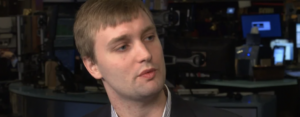 One reason crypto has grown exponentially is that there are many problems with the traditional financial system. Thanks to decentralized finance, people now have access to financial products and services without relying on intermediaries.
One reason crypto has grown exponentially is that there are many problems with the traditional financial system. Thanks to decentralized finance, people now have access to financial products and services without relying on intermediaries.
For instance, DeFi makes it possible for someone to lend or borrow money without dealing with a bank whatsoever. Of course, Defi also encompasses other aspects of the crypto ecosystem: such as stablecoins, the ability to stake crypto, yield farming, prediction markets, and more.
The DeFi sector TVL has dipped below $40 Billion due market turbulence and waning confidence. That said, the DeFi market size is projected to reach 232 Billion by 2030, and we have some of the following people to thank. Let’s examine four founding fathers of DeFi, their contributions, and why they’ve been influential in the rise of decentralized finance.
Andre Cronje

There’s no way to deny it: Andre Cronje is one of the founding fathers of DeFi. He’s a South African developer and entrepreneur responsible for Yearn Finance. Yearn Finance offers lending and trading services on the Ethereum blockchain.
Yearn Finance is one of the fastest-growing decentralized protocols of all time. At its inception in 2020, the $YFI token, the governance token for Yearn Finance, was worth around $30. The token eventually reached over $40,000 in a matter of several months. The value of the YFI token has declined in value since then, and is currently valued at $5,162, far greater it’s initial coin offering price of $14. Some of the latest YFI price predictions project it’s value surpassing $40,000 again by 2030.
While he remains one of the founding fathers of DeFi, Cronje has announced he is leaving the sector. He has taken breaks from decentralized finance before, but this seems to be permanent. Anton Nell, a colleague of his from the Fantom Foundation, is also leaving the space. It was recently reported that Cronje’s departure from DeFi was more for a “public perspective” and for appearances sake, and supposedly he never actually left the Fantom project.
Hayden Adams

You’re one of the founding fathers of DeFi if you’re responsible for the biggest decentralized exchange by volume, and that is the case with Hayden Adams. Adams is responsible for creating Uniswap in 2018.
Uniswap is a decentralized exchange that operates on Ethereum. It’s known for being the first to use an automated maker model, meaning the exchange doesn’t use order books. Instead, users supply tokens to liquidity pools. Then algorithms set prices to match supply and demand.
Adams might have never changed decentralized finance forever if he wasn’t laid off by Siemens. Uniswap, which boasts billions of dollars in total locked value, was created thanks to a $65,000 grant from the Ethereum Foundation.
Rune Christensen

If you’re responsible for the oldest DeFi project, you get bragging rights as one of the founding fathers of DeFi. That’s the case with Rune Christensen, the founder of MakerDAO. MakerDAO was created in 2014, and it’s a peer-to-peer organization allowing for the lending and borrowing of cryptocurrencies, thanks to smart contracts.
It’s also responsible for the stablecoin Dai, which has also been critical to DeFi growth in general. MakerDAO is a DAO, meaning that it is governed by token holders rather than a team of developers, engineers, or executives. MakerDAO was also the first DeFi project to reach the milestone of $1 billion in total locked value, or TVL.
In November 2021, Christensen joined DragonFly Capital as a venture partner.
Stani Kulechov

Stani Kulechov was a law student before he became one of the founding fathers of DeFi. He founded Aave (previously known as ETHLend) in 2017. It originally raised $16.2 million in an initial coin offering focused on creating a decentralized peer-to-peer lending platform. Aave was built on the Ethereum blockchain and is a DeFi lending protocol.
Aave was also originally built to handle hundreds of millions of dollars. The recently released v3 means that Aave is more equipped to handle scalability and risk mitigation risks associated with a DeFi ecosystem growing at this rate. Aave also now focused on being as cross-chain as possible and is now compatible with seven different blockchains.
While there is still stiff competition in the decentralized finance sector, Aave remains one of the biggest DeFi protocols in the world.
Is there room for new founding fathers of Defi?
Not one individual created DeFi, but these individuals played a role in expanding and evolving the sector. At the same time, decentralized finance is a sector worth billions of dollars that is technically only several years old.
There’s no question that decentralized finance will continue to change the world, especially given the countless use cases tokenization offers. DeFi will also grow thanks to its ability to offer financial services to the unbanked, and help those without access to traditional financial institutions become functioning members of society.
The fact that DeFi operates 24/7 is another clear advantage over traditional financial markets and services. Given that decentralized finance is just getting started, there is plenty of more room for new founding fathers of DeFi.
About the Author

Michael Hearne
About Decentral Publishing
Decentral Publishing is dedicated to producing content through our blog, eBooks, and docu-series to help our readers deepen their knowledge of cryptocurrency and related topics. Do you have a fresh perspective or any other topics worth discussing? Keep the conversation going with us online at: Facebook, Twitter, Instagram, and LinkedIn.


